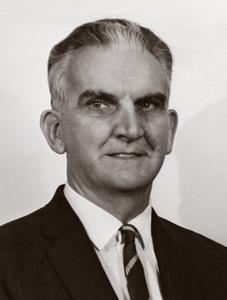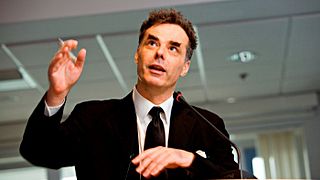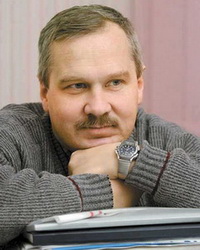Related Research Articles
Seymour Melman was an American professor emeritus of industrial engineering and operations research at Columbia University's Fu Foundation School of Engineering and Applied Science.

Economic sociology is the study of the social cause and effect of various economic phenomena. The field can be broadly divided into a classical period and a contemporary one, known as "new economic sociology".
Institutional economics focuses on understanding the role of the evolutionary process and the role of institutions in shaping economic behavior. Its original focus lay in Thorstein Veblen's instinct-oriented dichotomy between technology on the one side and the "ceremonial" sphere of society on the other. Its name and core elements trace back to a 1919 American Economic Review article by Walton H. Hamilton. Institutional economics emphasizes a broader study of institutions and views markets as a result of the complex interaction of these various institutions. The earlier tradition continues today as a leading heterodox approach to economics.
Amitai Etzioni was a German-born Israeli-American sociologist, best known for his work on socioeconomics and communitarianism. He founded the Communitarian Network, a non-profit, non-partisan organization dedicated to supporting the moral, social, and political foundations of society. He established the network to disseminate the movement's ideas. His writings argue for a carefully crafted balance between individual rights and social responsibilities, and between autonomy and order, in social structure. In 2001, he was named among the top 100 American intellectuals, as measured by academic citations, in Richard Posner's book, Public Intellectuals: A Study of Decline.

Economic conversion, defence conversion, or arms conversion, is a technical, economic and political process for moving from military to civilian markets. Economic conversion takes place on several levels and can be applied to different organizations. In terms of levels, conversion can take place at the level of new innovation projects, divisions within multi-divisional firms, companies, and national economies. In terms of objects, conversion can govern workers, firms and land. Some of these scales obviously overlap. Organizations that can be converted include defense firms, military bases, and defense laboratories.

Kenneth Ewart Boulding was an English-born American economist, educator, peace activist, and interdisciplinary philosopher. Boulding was the author of two citation classics: The Image: Knowledge in Life and Society (1956) and Conflict and Defense: A General Theory (1962). He was co-founder of general systems theory and founder of numerous ongoing intellectual projects in economics and social science. He was married to sociologist Elise M. Boulding.

The World Academy of Art and Science (WAAS), founded in 1960, is an international non-governmental scientific organization and global network of more than 800 scientists, artists, and scholars in more than 90 countries.

Daniele Archibugi is an Italian economic and political theorist. He works on the economics and policy of innovation and technological change, on the political theory of international relations and on political and technological globalisation.
Economists for Peace and Security (EPS) is a New York–based, United Nations accredited and registered global organization and network of thought-leading economists, political scientists, and security experts founded in 1989 that promotes non-military solutions to world challenges, and more broadly, works towards freedom from fear and freedom from want for all.
The Gore–Chernomyrdin Commission, or U.S.–Russian Joint Commission on Economic and Technological Cooperation, was a United States and Russian Joint Commission developed to increase cooperation between the two countries in several different areas. The Commission was developed by the United States’ President Bill Clinton and Russian President Boris Yeltsin at a summit in Vancouver in April 1993. Al Gore, the United States Vice President, and Viktor Chernomyrdin, the Russian Prime Minister, were appointed as co-chairmen and the committee derives its name from those two individuals. Before his appointment to the Commission, Chernomyrdin oversaw the Soviet national oil industry as minister from 1985–1989. After the fall of the Soviet Union, Chernomyrdin organized the Soviet oil industry into the Gazprom corporation.
Janine R. Wedel is an American anthropologist and university professor in the Schar School of Policy and Government at George Mason University and a senior research fellow of the New America Foundation. She is the author of several books and many articles on some key systemic processes of the day. She is the first anthropologist to win the Grawemeyer Award for Ideas Improving World Order.
Peace economics is a branch of conflict economics and focuses on the design of the sociosphere's political, economic, and cultural institutions and their interacting policies and actions with the goal of preventing, mitigating, or resolving violent conflict within and between societies. This violent conflict could be of any type and could involve either latent or actual violence. Recognizing the cost of violence, peace economics focuses on the benefits of (re)constructing societies with a view toward achieving irreversible, stable peace. Along with approaches drawn from other areas of scholarship, peace economics forms part of peace science, an evolving part of peace and conflict studies.

Henry R. Nau is professor of political science and international affairs at Elliott School of International Affairs at George Washington University. He is the author of a theory of American foreign policy known as conservative internationalism and a book by the same name.

Igor Yegorov is a Ukrainian economist, Sc.D. in Economics, Deputy Director of the Institute for Economics and Forecasting of the National Academy of Sciences of Ukraine, and Professor at the Faculty of Economics at the Taras Shevchenko National University of Kyiv. Until 2013 he was the Head of Department for Systemic Studies of S&T Potential at G.M. Dobrov Center for Scientific and Technological Potential and Science History Studies of the NAS of Ukraine. He is a member of the Academic Council of Scientific and Technical Complex for Statistical Research of the State Statistics Service of Ukraine.

Richard B. Norgaard is a professor emeritus of ecological economics in the Energy and Resources Group at the University of California, Berkeley, the first chair and a continuing member of the independent science board of CALFED, and a founding member and former president of the International Society for Ecological Economics. He received the Kenneth E. Boulding Memorial Award in 2006 for recognition of advancements in research combining social theory and the natural sciences. He is considered one of the founders of and a continuing leader in the field of ecological economics.
Georgy Toloraya, is a Russian diplomat, Expert, Panel of Experts, UN Security Council Committee established pursuant to SC Resolution 1718 (2006), Executive Director of Russian National Committee on BRICS research, Honorary Director, Center of Russian Strategy in Asia, Institute of Economics Russian Academy of Sciences, visiting professor at the Moscow State Institute of International Relations (MGIMO).

Alexei Georgievich Arbatov is a full member of the Russian Academy of Sciences, the Head of the Center for International Security at the Institute of World Economy and International Relations (IMEMO), and a scholar in residence at the Carnegie Moscow Center. He is a Russian political scientist, academic, author, and former politician.
Michael D. Intriligator was an American economist at the University of California, Los Angeles, where he was Professor of Economics, Political Science, and Policy Studies, and Co-Director of the Jacob Marschak Interdisciplinary Colloquium on Mathematics in the Behavioral Sciences. In addition, he was a Senior Fellow at the Milken Institute in Santa Monica, a Senior Fellow of the Gorbachev Foundation of North America in Boston, a Foreign Member of the Russian Academy of Science, and a Fellow of the American Association for the Advancement of Science. He received his Ph.D. in Economics at MIT in 1963 and the same year joined the UCLA Department of Economics. He taught courses in economic theory, econometrics, mathematical economics, international relations, and health economics, and received several distinguished teaching awards.
Artur Bartoszewicz is a Polish doctor of economic sciences, an expert in public policy, and a lecturer at the Collegium of Socio-Economics of the Warsaw School of Economics. From 2016 to 2018, he was the President of the National Board of the Polish Association of Experts and Assessors of European Union Funds. Since 2015, he has been a member of the Program Board of the Polish Platform for Homeland Security. Since 2019, he has been a Chairman of the Program Board of the Institute of New Europe. On October 15, he was appointed to the Board of the National Centre for Research and Development for 2020–2024.
References
- ↑ Archive of Sun articles This Nevada state website is an archive of articles published by the Sun. To locate Dumas' article titled "A powerful lesson" (Page 11A), search this webpage by date: Aug. 19, 2003.
- ↑ For example, you can access his interview "Turning Enemies Into Friends: Economics, Security, and Peace" on Aug. 8, 2008 .
- ↑ Formerly called Economists Allied for Arms Reduction (ECAAR), p. 8 of the Dec. 1998 ECAAR newsletter lists board members . The most current website is Webpage for Economists for Peace and Security.
- ↑ He is first editor and co-author. The preface was written by Sweden's Ambassador to Israel (1964–1966), Ambassador Inga Thorsson. Read more about Ambassador Thorsson in her obituary, 27 Jan., 1994, at The Independent People .
- ↑ Texas Governor Ann Richard's Executive Order AWR 91-9 establishing the Governor's Taskforce on Economic Transition, .
- ↑ Link to the official report: . In economics, these calculations are performed using a "multiplier." See Multiplier (economics).
- ↑ UHP Garrey Carruthers Chair in Honors.
- ↑ . For her work on corruption in Eastern Europe in her book, Collision and Conllusion: The Strange Case of Western Aid to Eastern Europe 1989–1998 (1st edition, New York: St. Martin's, 1998), Wedel won the Grawemeyer Award in 2001
- ↑ This link hosted by Wedel provides a brief description of the accountability project and the forthcoming monograph: .
- ↑ This statement appeared in a SLMK newsletter:
Dialogue with Decision Makers: Together with Russian PPNW we have arranged meetings in Moscow from which we have just returned. We had meetings on the Human Factor issue with a number of high level [ sic ] specialist, with the speaker of the State Duma, with the minister of Minatom, and at the Foreign Ministry. Prof Lloyd Dumas and Dr Christina Lundius were interviewed during 1,5 hours by Prof Kapitza in [h]is scientific TV program on the question of the Human Factor and [d]angerous technologies like Nuclear weapons.
- ↑ Review of The Peacekeeping Economy
- ↑ Reviews of The Overburdened Economy: JSTOR 2726044; JSTOR 20871715; JSTOR 1045746
- ↑ Review of The Conservation Response: JSTOR 3103946